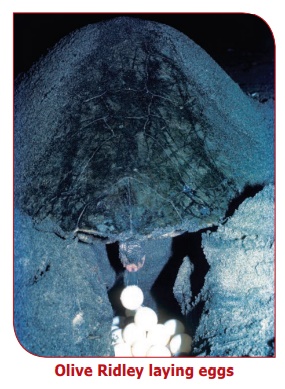Sea Turtles - Prose - Term 1 Unit 1 - 6th English - Sea Turtles: Section II | 6th English : Term 1 Unit 1 : Prose : Sea Turtles
Chapter: 6th English : Term 1 Unit 1 : Prose : Sea Turtles
Sea Turtles: Section II
Section II
Take turns and read this section aloud. Work in pairs and
underline the new words. Find out their meanings from the dictionary.
Between the months of
January and March, female Olive Ridleys come ashore at night to lay their eggs.
This is quite a problem for them, as a turtle’s front flippers
enable it to swim gracefully and effortlessly but are not very useful for moving
on land. The turtle has to haul itself laboriously onto the beach. Then it chooses a spot
well away from the high-tide line. Here, it scoops out a nest cavity 45 cm deep, into which it lays about 100 eggs.
Each egg is in the shape and size of a table tennis ball. Once all the eggs are
laid, the turtle fills in the cavity, then it camouflages
the nest by tossing sand on it using its flippers. That done, it returns to the
sea. The eggs are left to incubate under the
warmth of the sun.

In many places around
the world, local people follow the tracks of the turtle to its nest. They collect
the eggs for eating. Jackals, domestic dogs and pigs too dig up and eat the eggs
by following the scent left by the turtle. Those eggs that escape such people and
predators hatch 45–60 days later. The hatchlings
slash open the leathery eggshell with the help
of a tiny ‘egg-tooth’. This is like a razor blade at the tip of a hatchling’s snout. When most of the eggs
have hatched, the hatchlings push themselves upwards through the sand and emerge on the surface of
the beach. From here they make a hurried dash to the sea.
GLOSSARY
flippers - broad, flat limbs used for swimming
predators - animals that kill other animals for food
haul -
pull with force
slash –
cut
laboriously – with great effort
snout -
pointed nose of an animal
cavity - a
hollow space
emerge -
come out
camouflage - hide or disguise something
incubate - hatch eggs using warmth
Are these
statements right? Discuss with your partner and (✓) them if they
are correct. Correct them if they are wrong. Share your answers in Class.
1. Female Olive Ridleys
come ashore at night to lay eggs.
2. The eggs of an Olive
Ridley are in the shape and size of a cricket ball.
3. Ridleys come to lay
their eggs in the month of January.
4. The turtles use their
flippers and make a hollow for their nests.
5. The hatchlings use
a tiny egg-tooth to come out of the eggs.
Do you know
There is an interesting aspect of
sea turtle biology. The temperature inside the egg determines the sex of the embryo
while it is growing. When the eggs develop at 27o-28oConly male hatchlings are produced. At 30o
C only female hatchlings are produced. An equal mix of male
and female hatchlings is produced only when the eggs incubate at precisely 29o-30o C.
Related Topics